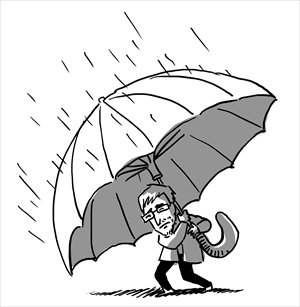Hong Kong’s tradition of liberty thrives

Illustration: Liu Rui/GT

The small city of Hong Kong has come under the global spotlight in the past few weeks after Edward Snowden, whistleblower of the National Security Agency (NSA), chose Hong Kong both to reveal the surveillance program of the US government and as his hiding place.
Although former US vice president Dick Cheney branded Snowden as a traitor and incumbent President Barack Obama said the US government would pursue Snowden's extradition from Hong Kong, many Hongkongers feel differently.
Close to 1,000 locals from civil rights and democratic groups as well as members of the public had a march on June 15 to the US Consulate General in support of Snowden and urged the Hong Kong Special Administrative Region (HKSAR) government to protect him.
In a recent online poll by Hong Kong's English daily South China Morning Post, half of the respondents were against handing Snowden to the US government, and 33 percent said Snowden is a "hero."
In his first comment on the Snowden case, Chief Executive Leung Chun-ying said on June 17 the HKSAR government would handle the case in accordance with the laws of Hong Kong. This is a reversal of attitude by Leung, who said he had "no comment" on the subject during his visit to New York from June 10 to 12.
The reaction of Hongkongers is perhaps more than Snowden expected. With the backing of Hongkongers, Snowden should be relieved that he may have made the right choice coming to the city. He told media that he decided to stay in Hong Kong because of its "spirited commitment to free speech and the right of political dissent" and he would let Hong Kong decide his fate.
With such a proclamation from Snowden, Hong Kong people feel it is their obligation to help a man who has so much faith in the civil society and legal system of the city.
Some people joked that Hong Kong is a "city of protests," but the fact that such a high number of protests have been allowed every year shows freedom of speech is guaranteed in Hong Kong.
The courts in Hong Kong, which are trusted by Snowden, are one of the pillars of the city. Hong Kong is not the most democratic entity in the world, but its traditions of a robust judicial system and the rule of law are widely respected.
The Snowden case comes at a time when Hong Kong is becoming decreasingly competitive compared to cities in the mainland and other Asian economies.
In a report by the China Institute of City Competitiveness released on June 18, Hong Kong's competitiveness dropped to fifth from second last year behind Guangdong, Jiangsu, Shandong and Zhejiang provinces.
But the Snowden incident is proof that the city has not lost its luster. Of all places in the world, a US citizen has chosen the city as his safe haven because he trusts Hong Kong can bring him justice. Snowden is the best poster boy for Hong Kong, if one that no one could have ever dreamed of.
In the latest development, Iceland received an informal inquiry from Snowden seeking asylum on June 18. Even if Iceland rejects Snowden's application, Hong Kong can offer him some protection.
Although Hong Kong has an extradition agreement with the US, if the fugitive's crime has a political nature, then the person cannot be extradited. In fact, Hong Kong rejected an extradition request from the US for an Iranian suspect in 2008.
Another trump card for Snowden is making good use of Hong Kong's judicial procedures. He can cite reasons like that he would be subject to inhumane treatment for political reasons in the US and appeal against his extradition in the city's courts, and the procedures could take years. There is nothing the US authorities can do, because they have to respect the law in Hong Kong.
There is no precedent for the Snowden case anywhere in the world. How it can be handled while not hurting the relations between Hong Kong, the mainland and the US will be a test of all three governments. The fate of Snowden will be closely watched by the world in coming days.
The author is a Hong Kong-born but Shanghai-based editor with the Global Times. heluyi@globaltimes.com.cn